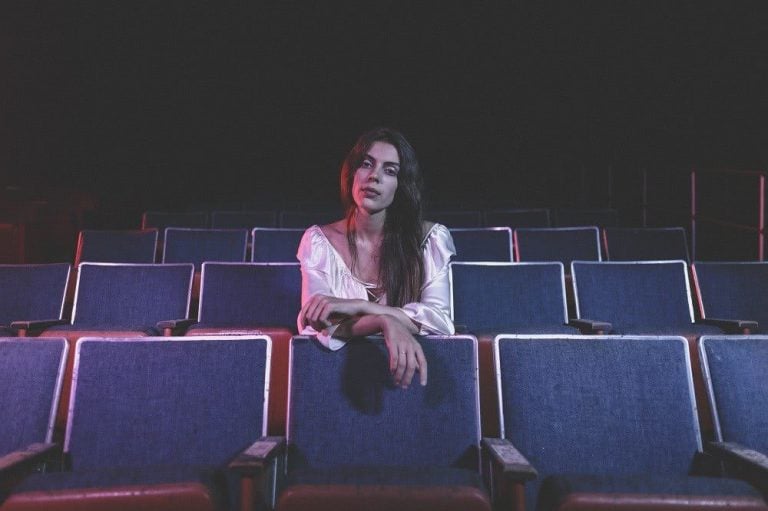Julie Byrne pens music that’s sweetened by its simplicity, but that’s not to say that it’s lacking in intellect. The New York-based singer-songwriter weaves thematic threads of romance, natural landscapes and the isolation of solo travel with hefty reverence throughout her latest album Not Even Happiness. Byrne has been in constant transit since she was 18, settling for brief periods in Kansas, Arkansas, Montana and Wyoming.
On ‘Sleepwalker’, a track full of significant warmth, her soft and strong vocals accompany quick successions of fingerpicked acoustic guitar, neither one overpowering the other: “I travelled only in service of my dreams,” she sings, “I stood before them all / I was a sleepwalker.” Indeed, Byrne’s roving lifestyle caused her to develop a dependence on aloneness – that is, until falling in love rooted her to New York City.
“There was a long period of my life, and even now I feel this way, where travel felt so freeing,” she explains. “I prioritised that lifestyle over any other options. But now I’m faced with the importance of building a home for myself … that wide-open feeling of groundlessness; it’s not healthy.”
While there’s the temptation to romanticise travel through our social networks, treating life on the road as a symbol of freedom, Byrne reveals this isn’t always the case. “I have dragged my lives across the country / And wondered if travel led me anywhere,” she sings on ‘I Live Now As a Singer’.
https://www.youtube.com/watch?v=Sesn6iLINPU
And when prodded as to exactly why it was an unhealthy lifestyle, Byrne explains, “Because everyone needs a space where they can rest and recover and have some solitude and privacy — it’s difficult to live without that for so long.”
Byrne was raised on the sounds of her father’s finger-style guitar playing and February marks her tenth year playing the instrument. “I’m a late learner,” she says. “When I was 17 my good friend had taken an acoustic guitar class as an elective in high school and so sometimes we would hang out and she would teach me the chords she was learning.”
Love Music?
Get your daily dose of metal, rock, indie, pop, and everything else in between.
Singing’s always felt like such a cleansing and therapeutic experience for me.
While her storytelling seems indicative of trends in alt-country and folk — there are images of passing scenery and a feminine strength similar to that of Gillian Welch, as well as Townes Van Zandt’s self-aware loneliness — she never intended to write to a specific genre. “I’ve never really listened to too much folk music, so it’s not like it was particularly a genre that I was looking to embody, it was just a natural thing,” she explains, “and singing’s always felt like such a cleansing and therapeutic experience for me.”
Not Even Happiness is the result of a collaboration with producer Eric Littmann and violinist Jake Falby; together they travelled to her childhood home in Buffalo to record the album. “They’re my family. We’ve really been through thick and thin together and they’re my soulmates in music … Eric is involved in a lot of projects in New York. In the day he works as an infectious disease researcher and by night he makes music and produces his friends’ albums … we’re pretty inseparable.”
The trio have carefully balanced the record with ambient noise and orchestral builds. “Eric and I had this vision for the accompaniment that it would always be building in the background until all of a sudden it would emerge and there would be these burgeoning moments of emphasis with synth or with field recordings.” It’s subtler classical elements can be attributed to Falby. “Jake is a classically trained musician and he’s played like symphony orchestras — he has a very strong intuition for the music.”
Having moved across different work fields, studying Environmental Science and working as a seasonal park ranger, she’s currently struggling with her newfound settlement in the music industry. “It’s very painful to say that [I only work in] music,” she says. “For over a decade I’ve always worked odd jobs: I’ve worked in the service industry, I’ve worked in sales, I’ve worked in retail, I’ve worked with the parks department. And I was always balancing music with what I had to do to make a living, so now it’s kind of a really profound moment of finally just having music be the only thing I’m working on.
“It is [scary] because the lifestyle of being a musician contains two kind of polar opposites … You have this lifestyle of touring where it’s very intense and you’re moving so quickly. You have very little personal space or even time enough to really get your bearings in a place before you leave for the next one, and there is something beautiful about surrendering to that rhythm and that pace. But then once an album cycle ends, your time is just open-ended … I’m definitely not a prolific writer … I feel like I don’t have any kind of control over when I feel that inspiration; I just find myself waiting for it.”
She weighs up each thought with care before speaking, ensuring honesty in her answers. On writing, she says, “It takes me a really long time.” Refusing to rush appears to be her approach to living; she’s spent a significant portion of her life moving through the States at a ponderous, gentle pace. With healing self-awareness, she sings, “I’ve been seeking God within.” Perhaps her music asks us to carry ourselves with similar care.
Julie Byrne will play City Recital Hall on Tuesday January 23. For more Sydney Festival coverage, pop on over to our interview with Lucas Abela.


































